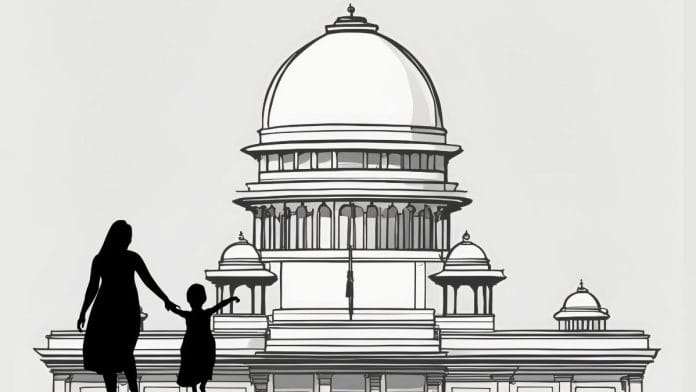New Delhi: A woman is entitled to maintenance from her second husband under the erstwhile Code of Criminal Procedure (CrPc), even if her first marriage is legally subsisting, the Supreme Court has held.
A bench of justices B.V. Nagarathna and S.C. Sharma last week reiterated the expansive interpretation given to the term “wife” in Section 125 of the CrPc (order for maintenance of wives, children and parents) while allowing an appeal filed by a woman against a Telangana High Court’s 2017 decision that declared she was not entitled to maintenance from her second husband because she was not legally divorced from the first one. The HC, however, allowed the plea for maintenance to the daughter born to the couple.
By setting aside the HC’s findings, the top court revived a Family Court order, giving relief to the woman and her daughter. The top court underscored the objective of the social welfare provision by giving it a beneficial construction. It said the law—Section 125 of the CrPc—is not a benefit received by a wife but rather a legal and moral duty owed by the husband.
The CrPc was replaced by the Bharatiya Nagarik Suraksha Sanhita (BNSS) last year.
An alternate interpretation would explicitly defeat the purpose of the provision by permitting “vagrancy and destitution” of women. Besides, it would give legal sanction to the actions of men, who would knowingly enter into marriage, avail its privileges but escape its consequent duties and obligations.
The crux of the case
In the case at hand, the woman, who separated from her first husband six years after their marriage, had dissolved her marriage by executing a Memorandum of Understanding (MoU) on 25 November 2005. Two days later, she married her neighbour, the contesting party in the present case.
Within months the second husband approached a Family Court, seeking dissolution of the marriage, which was allowed on 1 February, 2006.
On 14 February, 2006, the woman remarried her second husband and got her second marriage registered with the Registrar of Marriage, Chikkadpally, Hyderabad. The couple was blessed with a daughter on 28 January 2008.
However, on account of differences between the couple, the wife lodged a criminal case against her second husband. She accused him of dowry harassment. It was then that she approached the Family court for maintenance for her daughter and herself.
In 2012, the Family Court ordered Rs. 5,000 monthly maintenance for her and Rs. 3,500 for her daughter. But, on an appeal, the Telangana High Court set aside the maintenance order in 2017.
The case made it to the Supreme Court that year.
Before SC, the woman said since she and her second husband were living as a married couple and raising a child, the benefit of maintenance should be extended to her in terms of earlier Supreme Court judgments.
On the contrary, the husband’s lawyers opposed the grant of maintenance on the ground that the woman cannot be considered as a wife under section 125 CrPc as their marriage had no legal recognition. He too cited earlier SC judgements in support of his contention that since their marriage was void ab initio (invalid from the beginning), the woman was not entitled to claim maintenance.
What the Supreme Court said
The top court took into account all the earlier judgments that were put forward by the two sides and noted that standard of proof of marriage while claiming maintenance is not as strict as the requirements in a criminal trial, such as for bigamy.
It also noted that there is a divergence in judicial opinion on the question of whether women in live-in relationships can claim maintenance under Section 125 of the CrPc. This issue had been referred to a larger bench in another maintenance case in 2011.
The 2011 reference order, SC noted, talked about a broad and expansive interpretation of the term “wife”, including instances where a man and woman have been living together as husband and wife for a reasonably long period of time. It also said strict proof of marriage should not be a precondition for maintenance under Section 125 of the CrPc.
But in the case before it, the Supreme Court observed, the couple was not in a live-in relationship. This factual finding by the Family court about their marriage was not disputed by the second husband, it remarked.
Moreover, the second husband married the woman after being informed about her subsisting first marriage, not once but twice, the SC observed. Therefore, it held, the factum of the woman’s first marriage was not concealed from him.
The MoU, which was placed before the top court, declared the woman was living separately from her first husband and was not deriving any maintenance from him. Hence, the woman, SC concluded, was not even claiming dual maintenance.
Although SC has in the past denied maintenance in cases of subsisting marriage, the bench remarked that a plea of separation from the first marriage was not made in those cases. Therefore, it refused to apply the legal principles formulated in those matters to the present one before it, as the facts of this case were distinguishable from those.
While referring to a 2024 judgment in another maintenance case that shed a greater light on a husband’s moral duty towards his wife in the Indian context, the top court allowed the woman’s appeal and restored the Family Court’s order of July 2012.
“In the opinion of this Court, when the social justice objective of maintenance u/s. 125CrPC is considered against the particular facts and circumstances of this case, we cannot, in good conscience, deny maintenance to Appellant No. 1 (wife),” the court said.
(Edited by Sanya Mathur)
Also Read: From Romesh Thapar to Indra Sawhney, CJI Khanna’s picks on landmark SC verdicts that shaped India






